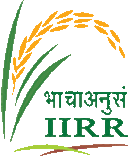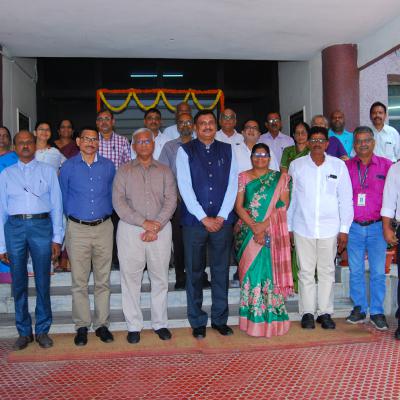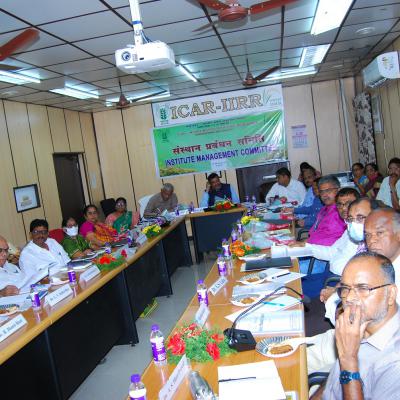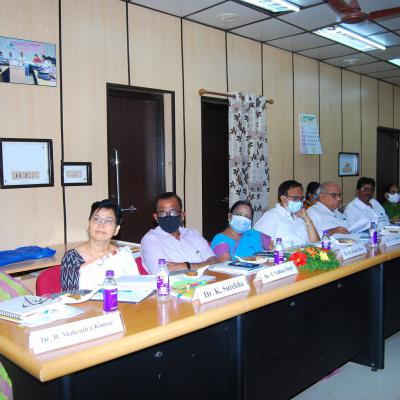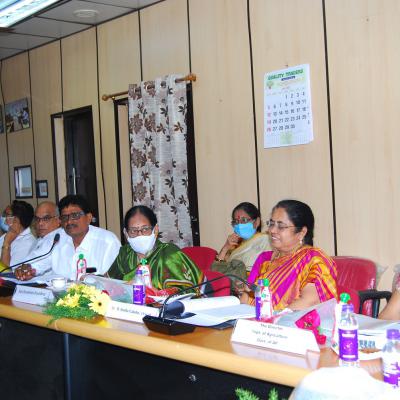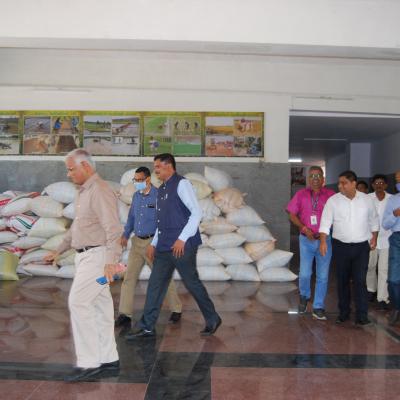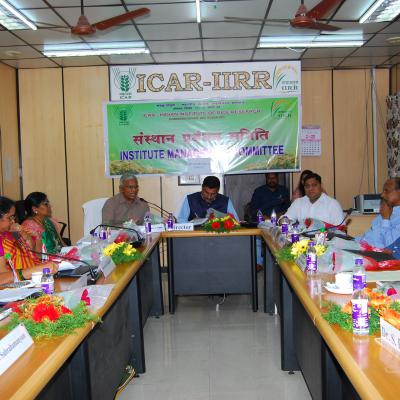
Dr. Kalyani S Kulkarni, Scientist
Name : Dr. Kalyani M. Barbadikar
Designation : Agricultural Biotechnology
Email Id : यह ईमेल पता spambots से संरक्षित किया जा रहा है. आप जावास्क्रिप्ट यह देखने के सक्षम होना चाहिए.; यह ईमेल पता spambots से संरक्षित किया जा रहा है. आप जावास्क्रिप्ट यह देखने के सक्षम होना चाहिए.
Phone : 040-24591209
Mobile : 91- 9724850169
Google scholar link : https://scholar.google.com/citations?user=or_amBwAAAAJ&hl=en
Research gate link : https://www.researchgate.net/profile/Kalyani-Barbadikar
ORCID link : https://orcid.org/0000-0002-7734-8916
Educational Qualification :
- B. Sc. (Biotechnology) : R.T.M.N.U., Nagpur, 2008
- M. Sc. (Agri.) : Anand Agricultural University, Anand, 2011
- Ph. D. (Plant Molecular Biology and Biotechnology) : Anand Agricultural University, Anand, 2014
Employment Record / Work Experience :
-
Scientist from 01.03.2015 - to date at ICAR-Indian Institute of Rice Research, Hyderabad.
-
Scientist Professional attachment training from 14.11.2014 - 28.02.2015 at ICAR-National Rice Research Institute, Cuttack.
-
Scientist Orientation training from 13.10.2014 to 13.11.2014 at ICAR-Indian Institute of Rice Research, Hyderabad
-
Scientist Three months training from 1.07.2014 to 30.09.2014 at ICAR-National Academy of Agricultural Research Management, Hyderabad
Area research specialization :
Biotechnological approaches for root related traits genomic mapping, plant-microbe interaction.
Important projects under taken :
As PI
DST – Early Career Research - RNA-seq based mapping of robust root system architecture for identification of candidate genes (2018-2021).
ICAR-IIRR – Core budget - Molecular and functional characterization of useful root traits in rice (2015-2021).
On-going Research Projects
Co-PI
ICAR- NASF - Exploiting haplotype diversity of rice genes controlling yield, stress tolerance and resource use efficiency traits for accelerating genetic gains.
ICAR- CRP- Biofortification in selected crops for nutritional Security-Rice.
ICAR-Plan Scheme: “Incentivizing Research in Agriculture” Project: Genetic modifications to improve biological nitrogen fixation for augmenting nitrogen needs of cereals.
DST-SERB - Characterization of strong culm Sambha Mahsuri mutants and identification of candidate genes associated with strong culm.
Award and Honors:
- Awarded best Scientist Crop Improvement 2022-23 at ICAR-IIRR, Hyderabad on the occasion of Foundation Day 2023.
- Delivered an invited talk on Biotechnological advances in rice organized by the Department of Genetics and Plant Breeding University of Agricultural and Horticultural Sciences, Shimoga on 28.12.2023.
- Invited as speaker during training program at NAARM, Hyderabad at “Application of Bioinformatics in Accelerating Agricultural Research” “Genome Assembly and Annotation” on 14th February, 2023.
- Invited as speaker during training program at Agri Biotech Foundation at Hyderabad.
- Delivered a lecture on Transcriptomics to the scientists and staff of ICAR IIRR Crop improvement divisional seminar on 25-05-2023.
- Faculty member of UG and PG/ PhD studies for Biochemistry and Molecular Biology 2023.
- Reviewed and Edited the articles for 3 Biotech, Frontiers in Plant Science etc.
Foreign Visit :
Participated in the International Training Workshop on Green Super Rice (Crop) Breeding Technology during 13th- 20th Nov 2016 held at Institute of Crop Science, Chinese Academy of Agricultural Sciences (CAAS), Beijing, China
Technologies/Products/Varieties/Novel germplasm/Methodologies developed:-
Developer / Trait identification
Germplasm registered with registered with NBPGR New Delhi (Developer)
The rice line TI-3 with INGR 23003 exhibits a robust root system architecture which plays a crucial role in nutrient uptake efficiency. Features – Increased root length, root volume, better seedling vigour index (contributing to early establishment), high yield under aerobic conditions (direct seeded); acceptable cooking quality, medium slender (MS) grain type, high yielding (26.9 g yield / plant), days to 50% flowering 119 days.
NCBI Submissions
NCBI Sequence Read Archive (SRA) with the BioProject ID (PRJNA846116)
Data for roots at panicle initiation stage BPT 5204 and TI-128 a robust root system architecture line along with bulk
Co-developer / Trait identification Assisted in the development / trait identification of registered lines:
RP6252-BV/RIL/1689 (CNN1) of Rice (INGR23077)
RP6257- SJ3 (Sampada× Jaya /3) of Rice (INGR23076)
IET29484 (RP6204-MB/RIL-J159) of Rice (INGR23075)
IET29482 (RP6211- PR/RIL-Q181) of Rice (INGR23074)
INGR23077 - RP6257-SJ3 (Sampada × Jaya/3) exhibits stable grain yield under N-Low and 50% of recommended N treatments. The identified genetic stock, RP6257-SJ3 Sampada × Jaya/3) recorded an average yield of 5.30-5.50 t. ha-1 under recommended N dosage and exhibits high NUE under low N inputs. It can be used as a potential donor in breeding program of rice NUE studies.
INGR23076 (IC650733), a novel breeding line with high and stable grain yield under graded levels of enhanced yields under low nitrogen fertilizer application is imperative to realize higher productivity under a realm of a rapidly changing climate. Towards, this, our team has developed a novel breeding material, INGR23076, which has better nitrogen use efficiency and grows very well under graded levels of nitrogen.
INGR23076 (IC650733) has high and stable grain yield under N-Low, N-50 and N- 100 fertilizer input. High nitrogen use efficiency under N-Low and N- 50 input.
INGR23076 (IC650733) is a novel breeding line with high and stable grain yield under N-Low, N-50The identified genetic stock, RP6257-SJ3 (Sampada × Jaya/3) recorded an average yield of 5.30-5.50 t. ha-1 under recommended N dosage and exhibits high NUE under low N inputs. It can be used as a potential donor in breeding program of rice NUE studies.
INGR23075 – Genetic stock - Inbred line with high grain Zinc (IET29484 RP6204- B/RIL-J159) - (2023) INGR23075 Possess micronutrient (Zn) content – 24.32 ppm in polished rice grain.
INGR23002 - Genetic stock - Inbred line with high Nitrogen Use Efficiency (RP6253-MV2 –Varadhan Stable grain yield under low nitrogen (N-Low), 50% of the recommended N (N-50) fertilizer inputs across tested field locations under AICRP - Rice. High Grain yield than Varadhan (Positive Check of NUE) under N-Low, N-50 and recommended N (N-100) fertilizer input. It has high Nitrogen Use Efficiency (NUE) under N-Low and N-50 input.
Patents/copyrights :
Student Guided :
- PhD Research Scholar Co-chairperson Dr Vishal Reddy
Genetics and Plant Breeding, Keladi Shivappa Nayaka University of Agricultural and Horticultural Sciences,
Shivamogga-577412, India. Completed and degree awarded in Jan 2024. - PhD Research Scholar Co-chairperson Mr. Nakul Magar, Genetics and Plant Breeding,Chaudhary Charan Singh University, Meerut, India Research work completed.
- MSc Research Scholar Chairperson Ms. Niharika Reddy
Genetics and Plant Breeding,PJTSAU Hyderabad Thesis submitted Viva Done-Degree awarded. - Supervisor / Mentor
Three months project work for completion of MSc degree in Biotechnology Ms. Mannem G Divya
Department of Biotechnology, School of Science, GITAM University, Visakhapatnam Thesis submitted on 02.04.2024.Degree awarded - Supervisor / Mentor
Three months project work for completion of MSc degree in Biotechnology Ms. Bankuru Neharika
Department of Biotechnology, School of Science, GITAM University, Visakhapatnam Thesis submitted on 02.04.2024-Degree awarded - Three months specialized training under supervision of Dr C N Neeraja, Principal Scientist, Head Biotechnology and Dr Kalyani M Barbadikar, Sr. Scientist.
- Mentor - Three months work experience program Mr. Yogaraj N, B. Tech (Biotechnology) Centre for Plant Molecular Biology and Biotechnology, Tamilnadu Agricultural University, Coimbatore 25th March to 25th May.
- Degree awarded-MentorThree months work experience program Mr. Jagadeeshwaran S, B. Tech (Biotechnology) Centre for Plant Molecular Biology and Biotechnology, Tamilnadu Agricultural University, Coimbatore 25th March to 25th May Degree awarded
Editors/Reviewers of the Journals :
Reviewed and Edited the articles for 3 Biotech, Frontiers in Plant Science etc.
Member of Scientific Society :
SPBB, New Delhi; SARR Society Hyderabad
Training Organized :
Course Coordinator
ICAR Sponsored 21 days Winter School on Development, Evaluation, and Biosafety Assessment of Genome Edited Crops: Hands-on Training from 20th January to 9th February 2023. Organized by ICAR- Indian Institute of Rice Research (IIRR) and Agri Biotech Foundation (ABF) Hyderabad, India
Coordinator for 3 days Workshop held at ICAR-IIRR
Workshop on Gene Editing for Enhancing Plant Productivity and Stress Tolerance (10-12 November 2019) Organized by Society for Plant Biochemistry and Biotechnology Pusa, New Delhi 110 012 and ICAR-Indian Institute of Rice Research Rajendranagar, Hyderabad 500 030.
Course Coordinator for 21 days Winter School held at ICAR-IIRR
ICAR Sponsored Winter School on Development, Evaluation, and Biosafety Assessment of Genome Edited Crops: Hands-on Training 20th January to 9th February 2023.
Training Resource person / Co-course coordinator
Fundamentals of Genomic Predictions and Data-Driven Crop Breeding training course in Hyderabad, India held from November 18 to 22, 2024 at ICAR-IIRR
Training imparted
A specialized training was provided to tenth-grade students from Olive Mount Global School as part of the National Science Day celebrations at ICAR-IIRR 2024. These students participated in an intensive five-day training program from 12th February to 16th February 2024. The program featured both theoretical sessions, basic hands-on practical, and field visits.
Course Director
Ten days hands-on training on “Genome Editing Technologies in Crops held from 14 th October to 23 rd October, 2024 at ICAR-IIRR
Training Undergone :
- Workshop on Understanding and Filing Intellectual Property Rights from Jan 27-28 2021, Schollwell EduTech (2 days).
- GWAS training workshop organized by SANH, Aberdeen UK from the June 7 - 12 2021 (6 days).
- Sensitization of AICRIP and Modern Breeding Techniques in Rice organized by Department of Plant Breeding, Crop Improvement, ICAR-IIRR during Sep 14- 15 2021 (2 days).
- Hands-on training on CRISPR/Cas9 mediated Gene-editing in plants organized by University of Hyderabad Oct 3 - Oct 10 (8 days).
- Breeding Innovation for Crop Improvement to Enhance Genetic Gains organized by IRRI-India from Oct 20 2021- Nov 16 2021 (21 days).
- CeRA - One Day Regional Training-cum-Awareness Workshop on J-Gate@CeRA for the Southern Region at TNAU, Coimbatore.
- One Day Workshop on Targeted GBS on 14/06/23 at ATS Genetech, organized by Thermo Fisher Scientific at Hyderabad.
Publications (Top 30) :
- Nakul D. Magar, Kalyani M. Barbadikar, Vishal Reddy, Padmashree Revadi, Pritam Guha, Dhiraj Gangatire, Divya Balakrishnan, Shailendra Sharma, M. Sheshu Madhav, Raman M. Sundaram. 2024. Genetic mapping of regions associated with root system architecture in rice using MutMap QTL-seq, Plant Physiology and Biochemistry, Volume 213, 108836, ISSN 0981-9428, https://doi.org/10.1016/j.plaphy.2024.108836. Corresponding author
- Gokulan, C.G., Bangale, U., Balija, V. et al. Multiomics-assisted characterization of rice-Yellow Stem Borer interaction provides genomic and mechanistic insights into stem borer resistance in rice. Theor Appl Genet 137, 122 (2024). https://doi.org/10.1007/s00122-024-04628-7
- Revadi, P., Barbadikar, K.M., Magar, N.D., Balakrishnan, D., Channappa, G., Siddaiah, A.M., Madhav, M.S., Bharamappanavara, M., Phule, A.S., Diwan, J. and Sundaram, R.M., 2023. Genome-wide association studies in rice germplasm reveal significant genomic regions for root and yield-related traits under aerobic and irrigated conditions. Frontiers in Plant Science, 14, p.1143853.
https://doi.org/10.3389/fpls.2023.1143853
Corresponding and first author equal contribution - Suneel Ballichatla, Gokulan C. G., Kalyani M Barbadikar, Anil A Hake, Gopi Potupureddi, Pritam Kanti Guha, Amol S Phule, Nakul D Magar, Vishalakshi Balija, Komal Awalellu, Premalatha Kokku, Suresh Golla, Sundaram Raman Meenakshi, Padmakumari Ayyangari Phani, Laha Gouri Shankar, Senguttuvel Ponnuvel, SubbaRao Lella Venkata, Hitendra K Patel, Ramesh Venkata Sonti, Sheshu Madhav Maganti, Impairment in a member of AP2/ERF and F-box family protein enhances complete panicle exsertion in rice, Journal of Experimental Botany, Volume 75, Issue 18, 27 September 2024, Pages 5611–5626, https://doi.org/10.1093/jxb/erae244
- Hake AA, Ballichatla S, Barbadikar KM, Magar N, Dutta S, Gokulan CG, Awalellu K, Patel HK, Sonti RV, Phule AS, Varma EP, MS Madhav. 2023. Combined strategy employing MutMap and RNA-seq reveals genomic regions and genes associated with complete panicle exsertion in rice. Molecular Breeding. Sep;43(9):1-20. 10.1007/s11032-023-01412-1
Corresponding author - Revadi, P., Magar, N.D., Miriyala, A., Barbadikar, K.M., Lokesha, R., Siddaiah, A.M., Gireesh, C., Padmini, P.N., Madhav, M.S., Sundaram, R.M. and Badri, J., 2023. Identification of potential rice lines harboring phosphorus uptake 1 QTL using diagnostic markers. Plant Physiology Reports, pp.1-6. https://link.springer.com/article/10.1007/s40502-023-00728-6
Corresponding author - Magudeeswari, P., Balakrishnan, D., Fukuta, Y., Saito, H., Saitheja, D., Pranay, G., Padmashree, R., Barbadikar, K.M., Badri, J., Senguttuvel, P. and Sruthi, K., 2024. Linkage mapping and quantitative trait loci detection for seedling vigor and grain size in advanced backcross introgression lines from wild accessions of Oryza nivara. Genetic Resources and Crop Evolution, pp.1-17.
- Padmashree R., Reddy, V., Barbadikar, K.M., Magar, N.D., Balakrishnan, D., Gireesh, C., Siddaiah, A.M., Badri, J., Lokesha, R., Ramesha, Y.M., Senguttuvel, P. and Diwan, J.R., 2023. G× E analysis to Identify the Stable High-yielding Rice Lines among a Set of Selected Germplasm Panel. International Journal of Environment and Climate Change, 13(7), pp.10-23. 10.9734/ijecc/2023/v13i71849. Corresponding author
- Padmashree R., Honappa, Reddy Vishal, Magar Nakul D, Barbadikar Kalyani M., Balakrishnan Divya, Gireesh C., Siddaiah Anantha M, Badri Jyothi, Lokesha R. and Ramesha Y. M., Senguttuvel P., Diwan J. R., Madhav Maganti Sheshu, Rani Ch. Suvarna, Sundaram R. M. (2023). Assessment of Multiple Tolerance Indices to Identify Rice Lines Suitable for the Aerobic System of Cultivation. International Journal of Plant & Soil Science, 35 (11). pp. 16-28. ISSN 2320-7035. 10.9734/ijpss/2023/v35i112941 Corresponding author
Anil A Hake, Nakul Magar, Kalyani M Barbadikar, Suneel Ballichatla, Kommana M, Amol S Phule, Gokulan CG, Hitendra K Patel, Ramesh V Sonti, Sundaram RM and Sheshu Madhav Maganti 2024. In silico Identification of Alternatively Spliced Variants from Transcriptome Data of Rice Lines Exhibiting Complete Panicle Exsertion. 17-(1), 2024; https://doi.org/10.58297/ZOSA3483.
Corresponding author - Vishal Reddy, Kalyani MB, Nakul D M, Padmashree R, Waghmode B D, Manjunatha B, Divya B, Gireesh C, Anantha M S, Dushyantha Kumar B M, Satish K M, Usha T N, Kalleshwara Swamy C M, Prem Sagar S P, Madhavilatha K, Anil A Hake and Lokesha R. 2023. Exploration of Genetic Variability and Trait Association for Root Architecture Related Traits under Aerobic Conditions in Rice (Oryza sativa L.). 16-(2), https://doi.org/10.58297/GMSL7598
Corresponding author - Reddy, V., Kalyani, M.B., Nakul, D.M., Padmashree, R., Manjunatha, B., Divya, B., Dushyantha Kumar, B.M., Satish, K.M., Usha, T.N., Kalleshwara Swamy, C.M. and Lokesha, R., 2023. Analysis of Genetic Variability and Correlation in Rice (Oryza sativa L.) Recombinant Inbred Lines (F6) for Yield and Its Component Traits. Int. J. Environ. Clim. Change, 13(12), pp.152-159.Corresponding author
- Nikhil, B.K., Sagar, S.P., Suresh, J., Swathy, V., Ravindra, C., Kumar, S.C., Prashanath, M., Madhyavenkatapura, A.S., Barbadikar, K.M., Senguttuvel, P. and Swamy, A.V.S.R., 2023. Genetic Diversity Analysis of Oryza glaberrima Derived Introgression Lines under Direct Seeded Condition. International Journal of Environment and Climate Change, 13(9), pp.3058-3064.
- CA, Manoj, Basavaraj PS, Kalyani M. Barbadikar, Diwan JR, Sundaram RM, R. Mahender Kumar, Kemparaju KB, and Anantha MS. "Dissecting the Genetic Relationship between Root Morphological Traits with Grain Yield of Introgression Lines (ILs) Derived from Wild Rice (Oryza rufipogon Griff) under Low Soil Phosphorous Condition." International Journal of Plant & Soil Science 35, no. 22 (2023): 57-80.
Any other Information :
- My major research focus is towards enhancing the root system architecture in rice for better nutrient use efficiency, and climate resilience. My research pertains to the identification of genomic regions, genes, markers - SNPs associated with robust root system architecture, higher nutrient uptake, and nutrient use efficiency by conglomerating conventional and high-end state-of-the-art technologies. I am further interested in deploying new breeding techniques and next-generation technologies for unraveling the functional basis of these traits. I am also fascinated by the area of host-pathogen/ pest, beneficial endophyte, host-biocontrol, and host-microbial interactions.
- The germplasm TI-3 has potential of high yield with low inputs especially water and be well adopted by the farmers to increase the income by saving amount on fertilizer/ water inputs. The other lines that we have as a team developed having low input agricultural traits like high zinc, low nitrogen / low phosphorous/ less water or limiting water / aerobic rice are extremely important for farmer communities in state as well as for the nation.
The varieties like DRR Dhan 65 has potential to yield high under adverse conditions and hence is considered as climate resilient. The large scale adoption of this line is promising for the farmers and stakeholders. - Similarly, as a team, we have identified microbes that possess plant growth promotion as well as increase nitrogen use efficiency of the rice plants. Such formulations also benefit the farmers. As a member of the team, we have identified potential endophytic cultures that can augment the nitrogen use in rice fields as well as under pot cultures. The identified endophytes related genomic information has been deposited to the NCBI. These endophytic cultures can be made into formulation – liquid biofertilizers that has much impact in farmer’s field for meeting nitrogen requirements. Moreover, such liquid biofertilizers have plant growth promotion activities that may reduce the farmer’s application of fungicides/ insecticides.
- The complete panicle emergence lines have comparatively high yield that is being accounted by complete emergence of the panicle without any percentage of panicle choking. Such lines are better in yield that other particle emergence lines and hence are beneficial for the farmers.
- Yellow stem borer is a major devastating pest in rice. Lines identified and the genes identified through genome and transcriptomic studies have the targets to design green control strategies for pest control. Such information is highly beneficial for the private pesticides manufacturing companies to identify the targets for pest control. Such targeted pest control strategies are environment and farmer friendly (lesser quantity of pesticides application). Strong culm rice lines have potential to withstand the adverse conditions of winds/ weather in coastal regions and hence the farmers can adopt such lines for cultivation.
- Elucidation of long non-coding RNAs and association of molecular markers for important root traits under aerobic condition Identified long non-coding RNA (lncRNAs) and transcripts (mRNAs) in the roots of the line having robust root system viz. TI-128 (LT), aerobic adapted cultivar CR Dhan 202 (LC), flooding adapted mega variety BPT-5204 (LB) at the panicle initiation. The highly expressed lncRNAs having more than fivefold higher expression in the roots of LT and LC compared with LB viz. XLOC_051452, XLOC_054216, XLOC_049896, XLOC_054177, XLOC_066547, XLOC_040153 and downregulated lncRNAs viz. XLOC_014786, XLOC_033409, XLOC_040432, XLOC_041798, XLOC_046238, XLOC_052121 are the lncRNA candidates for further study and investigation.
- Harnessing haplotype diversity of genes controlling yield, stress tolerance, and resource use efficiency traits in rice for accelerating genetic gains Identified the lines from 3 K panel (indica) for early seedling vigor (ESV) traits and yield-attributing traits under direct-seeded rice (DSR) and irrigated conditions. Also identified Marker- Trait association (MTA) for the grain size related traits, DSR related traits, yield related traits.
- Identification and characterization of fungal effectors and host factors in rice- false smut pathosystem
Identified highly expressed genes from rice (host) and fungal pathogen (false smut) during interaction at days post inoculation. - Elucidation of Pi68-based resistance to leaf and neck blast for enhanced utilization of host plant resistance in the management of rice blast Developed with the PI as mentor the construct using pRGEB32 and pJYABE for gene editing of a novel blast resistance gene Pi68 encoding a malectin-serine threonine kinase (Os03g0281466) and conferring field level resistance to leaf as well as neck blast in rice.
